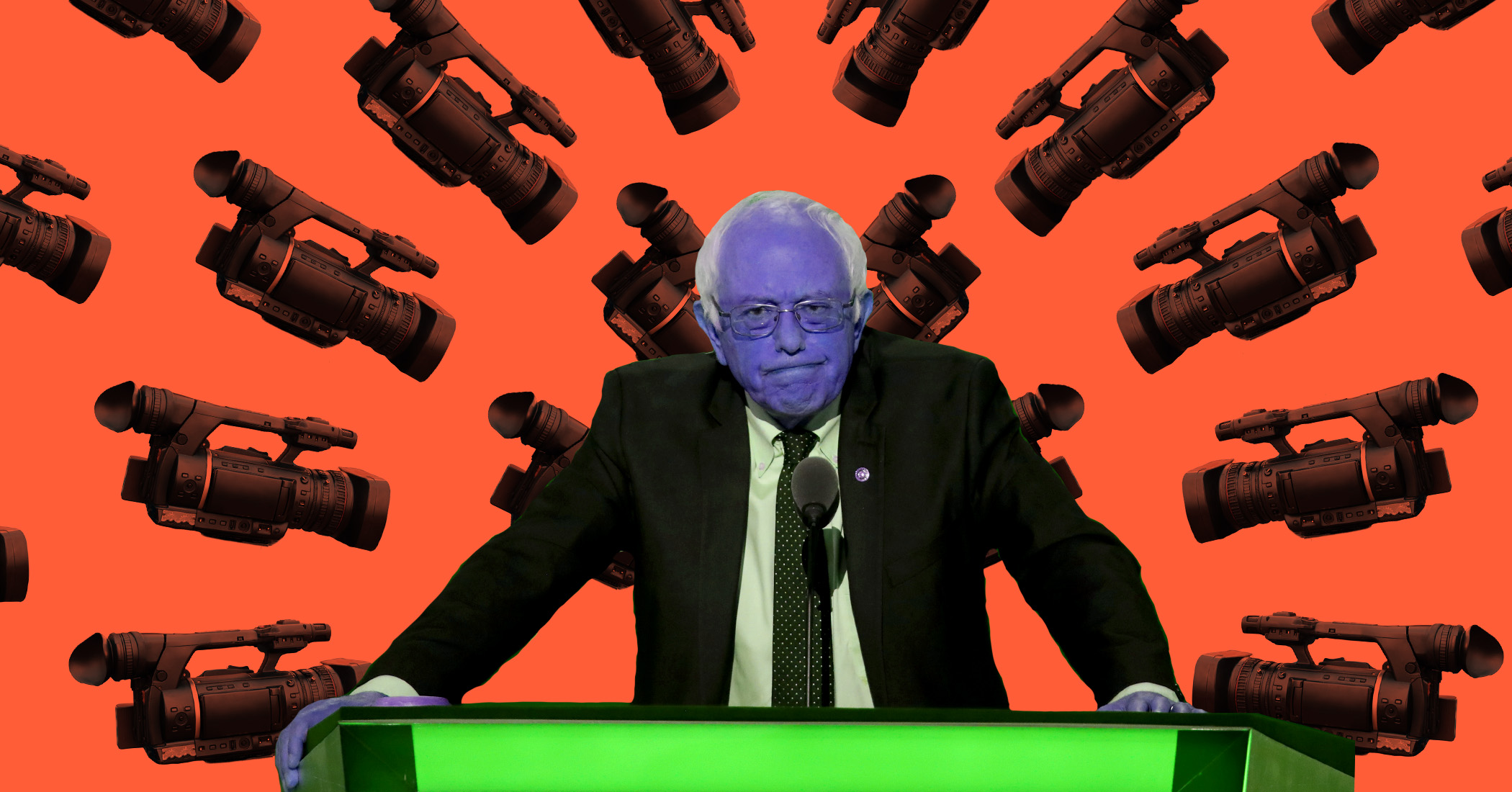Bernie vs. the mainstream media
What the establishment still won't admit about the new Democratic frontrunner


A free daily email with the biggest news stories of the day – and the best features from TheWeek.com
You are now subscribed
Your newsletter sign-up was successful
As Sen. Bernie Sanders has climbed in the polls over the past month, essentially becoming a co-frontrunner with former Vice President Joe Biden in the race for the Democratic presidential nomination, the mainstream media has gone from ignoring the candidate to treating him like an existential threat. According to his many critics, whether they're on Twitter, MSNBC, or writing in the coveted pages of The New York Times, Sanders has a political style that is eerily similar to that of Donald Trump's, and nominating him would be nothing less than an act of "insanity."
"Three years into the Trump administration, we see little advantage to exchanging one over-promising, divisive figure in Washington for another," declared the Times' editorial board in their dual endorsement of Senators Elizabeth Warren and Amy Klobuchar, portraying Sanders as a kind of mirror image of the reactionary president. This notion that Sanders is the left-wing version of Trump has had great appeal to those who reject most of his agenda (especially on the economy) but prefer not to admit it out loud. They claim to object not because Sanders' policies would fundamentally transform America's economy and redistribute wealth and power back into the hands of working people, but because his political style is supposedly so divisive and "Trumpian."
This lack of substance was on display during the Times editorial board's interview with Sanders, when editor Nick Fox asked the senator how holding rallies to garner support for his agenda and sustain a grassroots movement after the election would be any different from what President Trump has been doing. "Given what we've gone through over the last three years when Democrats hear about the president flying around the country holding rallies, they might cringe."
The Week
Escape your echo chamber. Get the facts behind the news, plus analysis from multiple perspectives.

Sign up for The Week's Free Newsletters
From our morning news briefing to a weekly Good News Newsletter, get the best of The Week delivered directly to your inbox.
From our morning news briefing to a weekly Good News Newsletter, get the best of The Week delivered directly to your inbox.
While liberals and centrists may have a more technocratic approach to governing, leftists believe that building and maintaining popular grassroots movements is essential for achieving the kind of change they want to see happen. The fact that New York Times editors see this approach as "Trumpian," however, reveals more about their own blinds spots and class biases than it does about Sanders and the movement that supports him. If there are similarities between Sanders in 2020 and Trump in 2016, it's that they both tapped into anti-establishment anger and caught the political elite and mainstream media completely off guard.
Since he became a front-runner, the media has blatantly tried to torpedo Sanders' campaign, but if anything this assault has backfired. After CNN's debate moderators ganged up on Sanders at the last Democratic debate with a number of questions parroting right-wing talking points — a performance that "compromised [CNN's] claim to journalistic neutrality," according to The Nation's Jeet Heer — the Sanders campaign had its most successful fundraising day to date and climbed in post-debate polls.
The flagship liberal news network, MSNBC, has been even more openly hostile to Sanders. After ignoring the senator for most of the primaries, the network has ratcheted up attacks in recent weeks, the most embarrassing and petty coming from host Joy Ann Reid, who invited on her show a "body-language expert" (with previous Fox News appearances on her resume) to claim that Sanders was lying about his private conversation with Elizabeth Warren (while comparing the senator's posture to that of a turtle).
These examples help explain why the majority of Americans don't trust the media. Since Gallup started measuring trust in mass media 50 years ago, it has fallen from nearly three-quarters (72 percent) in 1976 to 41 percent today. Incessant claims of "liberal bias" by conservatives played an undeniable role in this decline, but in reality the mass media today has more of a "center" or even "corporate" bias, which explains its obvious hostility towards a left-wing candidate like Sanders. This collapse in credibility reflects a widening global rejection of a system that has failed the majority of working people. The French geographer, Christophe Guilluy, for example, could have easily been describing the U.S. in his recent book on French politics, Twilight of the Elites: "After several decades of increasing economic and social insecurity, the working class no longer recognizes the legitimacy (much less the moral superiority) of its former governors. The reaction of the dominant classes, caught by surprise, has been to ostracize working-class society ever more completely. But it is too late; their authority has ceased to be admitted."
A free daily email with the biggest news stories of the day – and the best features from TheWeek.com
More and more viewers are also tuning out from the mainstream media. According to Pew Research Center, the number of Americans who get their news most often from television dropped by almost 10 points in two years, from 57 percent in 2016 to 49 percent in 2018, while a third of people now get their news primarily from websites and 20 percent from social media (sadly, a historic low of 16 percent cite newspapers as their go-to source). For Americans older than 65, TV is the primary news source, at 81 percent, while a mere 16 percent of 18-29 year olds get their news from television. Not surprisingly, the median age of a CNN viewer in 2017 was 60, while the median for Fox News and MSNBC viewers was 65.
The fact that older voters dislike Sanders while young voters love him is a testament to these media trends. The legacy media freakout over Sanders has served as a kind of endorsement of the senator for the millions of American voters who no longer trust Washington insiders and Beltway pundits. The latest attempts to rehash the "Bernie Bro" narrative, despite the fact that Sanders has an incredibly diverse base, with more non-white supporters than any other candidate (as in 2016, the divide in 2020 is more of a generational divide than anything else), is another way the media has shown they are unwilling to acknowledge the depth of his support.
If Sanders does end up getting the nomination, it is unclear how legacy media will respond, but it wouldn't be surprising if many of the centrist pundits and commentators who have spent the past three years going on about Russia suddenly rethink their position on Trump. As Luke Savage recently put it in Jacobin, "If Trump's ascendancy shattered their cherished political orthodoxies, Sanders' now threatens their political power — raising the specter of a genuine and lasting populist turn in American society they may find it difficult to reverse."
One thing is certain: the media campaign to stop Sanders from getting the nomination will only continue to intensify in the coming months.
Want more essential commentary and analysis like this delivered straight to your inbox? Sign up for The Week's "Today's best articles" newsletter here.
Conor Lynch is a freelance journalist living in New York City. He has written for The New Republic, Salon, and Alternet.
-
 6 of the world’s most accessible destinations
6 of the world’s most accessible destinationsThe Week Recommends Experience all of Berlin, Singapore and Sydney
-
 How the FCC’s ‘equal time’ rule works
How the FCC’s ‘equal time’ rule worksIn the Spotlight The law is at the heart of the Colbert-CBS conflict
-
 What is the endgame in the DHS shutdown?
What is the endgame in the DHS shutdown?Today’s Big Question Democrats want to rein in ICE’s immigration crackdown
-
 The billionaires’ wealth tax: a catastrophe for California?
The billionaires’ wealth tax: a catastrophe for California?Talking Point Peter Thiel and Larry Page preparing to change state residency
-
 Bari Weiss’ ‘60 Minutes’ scandal is about more than one report
Bari Weiss’ ‘60 Minutes’ scandal is about more than one reportIN THE SPOTLIGHT By blocking an approved segment on a controversial prison holding US deportees in El Salvador, the editor-in-chief of CBS News has become the main story
-
 Has Zohran Mamdani shown the Democrats how to win again?
Has Zohran Mamdani shown the Democrats how to win again?Today’s Big Question New York City mayoral election touted as victory for left-wing populists but moderate centrist wins elsewhere present more complex path for Democratic Party
-
 Millions turn out for anti-Trump ‘No Kings’ rallies
Millions turn out for anti-Trump ‘No Kings’ ralliesSpeed Read An estimated 7 million people participated, 2 million more than at the first ‘No Kings’ protest in June
-
 Ghislaine Maxwell: angling for a Trump pardon
Ghislaine Maxwell: angling for a Trump pardonTalking Point Convicted sex trafficker's testimony could shed new light on president's links to Jeffrey Epstein
-
 The last words and final moments of 40 presidents
The last words and final moments of 40 presidentsThe Explainer Some are eloquent quotes worthy of the holders of the highest office in the nation, and others... aren't
-
 The JFK files: the truth at last?
The JFK files: the truth at last?In The Spotlight More than 64,000 previously classified documents relating the 1963 assassination of John F. Kennedy have been released by the Trump administration
-
 'Seriously, not literally': how should the world take Donald Trump?
'Seriously, not literally': how should the world take Donald Trump?Today's big question White House rhetoric and reality look likely to become increasingly blurred
